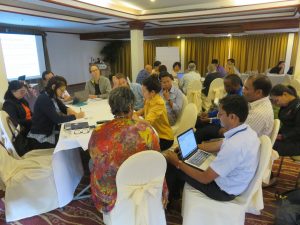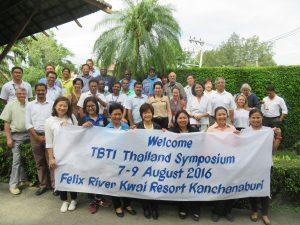TBTI held a three-day Symposium on Small-Scale Fisheries in Asia-Pacific Region and Beyond in Kanchanaburi province, Thailand on August 7-9, 2016. The symposium attracted the participation of more than 30 practitioners and researchers from Asia-Pacific region and Africa. It focused on aspects of SSF that are relevant for the Asia- Pacific region, particularly those related to inland fisheries, values of fish for food security, gender in fisheries, and community responses to global change.
The symposium was an opportunity to discuss research agenda and capacity development program needed for promoting sustainable SSF and for the implementation of the Voluntary Guidelines on Securing Sustainable Small-Scale Fisheries (SSF Guidelines) in the region. Since participants were from within and outside Asia-Pacific, the symposium offered a unique opportunity for lesson sharing and cross-fertilization of ideas and experience, fostering also inter-regional collaboration in research and training.
The symposium was structured around the four TBTI research clusters: Inland Fisheries, Fish as Food, Global Change Responses, and the newly added group, Women and Gender. Each cluster was introduced through a presentation and discussion of the value and knowledge gaps surrounding each cluster as well as current research efforts. For example, the Inland Fisheries cluster introduced its e-book 'Inter-Sectoral Governance of Inland Fisheries’, which consists of case studies around the world detailing current governance issues in inland SSF. The Fish as Food cluster presented initial results of the global meta-analysis of the role of SSF in food security. Also, for each research cluster, several attendees gave brief presentations to share circumstances and lessons learned from their study areas.
The workshop participants identified essential themes and needs for each cluster and possible linkages among them. For example, the Inland Fisheries cluster identified four thematic categories:
- Make ‘hidden’ SSF including inland subsistence, aboriginal, part time, and migratory fishers visible at the policy level;
- Emphasize awareness of barriers to access in inland SSF;

- Improve strategies for addressing data gaps in inland SSF;
- Account for inland-specific concerns in policy discussions.
Another highlight of the workshop were the two rounds of break-out group discussions facilitated by the participating clusters to identify emerging issues and develop policy statement. The following are some of the issues surrounding future research agenda identified by Fish as Food and Women and Gender clusters.
- Think of ways to improve post-harvest practices relating to product safety and storage;
- Ensure availability and accessibility of small pelagic fish to poor people and local consumption;
- Promote products, such as fish cakes and noodles made with fish, from fishmeal of consumption grade to fortify diet;
- Market policy shift from export-oriented to domestic trade;
- Promote policy and actions that target pre- and post-harvest activities considering women health, access to technology, and access to market;
- Consider the potential benefits of gender-based preferential rights within preferential fishing rights for SSF in coastal waters;
- Consider SSF as small, family-based businesses including pre-, post-harvest and administration so to adequately account for women role in SSF.
The full report from the symposium will be soon available.

















